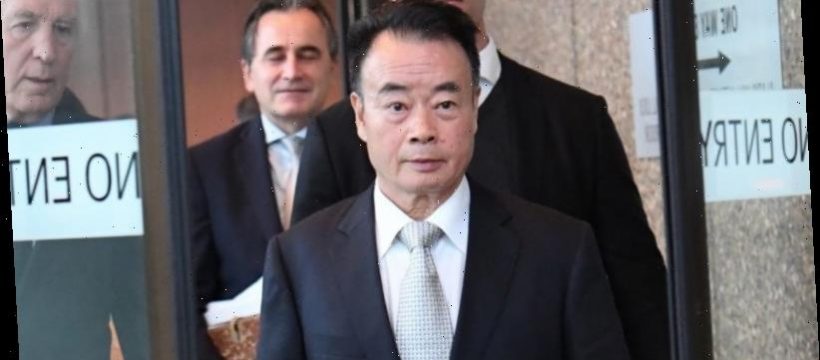The ABC and Nine have been ordered to pay Chinese-Australian businessman Chau Chak Wing $590,000 in damages after a Federal Court judge found the media outlets defamed him by suggesting he paid “bribes” in the form of political donations.
The media outlets said they were “deeply disappointed” by the judgment and urged state and territory legislators to take urgent steps to pass reforms to defamation laws that have been agreed upon by a national working group.
Mr Chau launched defamation proceedings in July 2017 against the ABC, Nine Entertainment Co and journalist Nick McKenzie, an investigative reporter at the Nine-owned The Age and The Sydney Morning Herald, over a Four Corners broadcast presented by McKenzie in June that year.
Businessman Chau Chak Wing leaves the Federal Court in Sydney in 2018.Credit:Peter Rae
In a statement of claim, Mr Chau’s lawyers alleged the program defamed their client in six ways, including by suggesting he is a spy who “betrayed his country, Australia” in order to serve China’s interests; carried out the work of a secret lobbying arm of the Chinese Communist Party (CCP), the United Front Work Department; and paid large sums to Australian political parties as “bribes” intended to influence politicians to favour the CCP.
The ABC and Nine denied the broadcast conveyed those meanings. Federal Court Justice Steven Rares found the program did not convey that Mr Chau was a spy but did convey four of the six meanings, including that he paid political donations intended as bribes and carried out the work of a secret lobbying arm of the CCP.
Those claims were “untrue and seriously defamatory”, he said, and ordered the ABC and Nine to pay $590,000 in damages, including aggravated damages.
The ABC and Nine said in a statement on Tuesday the decision would “have a further chilling effect on media freedom in this country”. The program had “raised matters of vital public interest”.
“Today’s decision confirms the program did not convey two of the more serious allegations the plaintiff had claimed,” the outlets said.
“Not only did the ABC and Nine have to defend imputations the reporting never intended to convey, they were forced to do so before the Court had even determined [whether] the program did in fact convey those imputations.”
Justice Rares said the broadcast “besmirched” Mr Chau’s reputation for philanthropy and the four imputations “struck at the heart” of his good name.
In a preliminary decision in 2018, Justice Rares ruled the media outlets could not run a truth defence because the particulars they pleaded in support of the defence were insufficient to prove the truth of the imputations.
In February 2019 Mr Chau won a separate defamation case against the Herald over an online article linking him to a US bribery scandal. He was awarded $280,000 in damages.
There is a $421,000 cap on damages for non-economic loss in defamation cases, but the cap – adjusted annually – may be exceeded when aggravated damages are awarded.
The states and territories agreed to changes to national defamation laws last year to reduce the size of damages payouts and introduce a new public interest defence, but so far only NSW, Victoria and South Australia have passed laws to give effect to those changes. The amendments will not take effect until all states follow suit and a commencement date is selected.
“The ABC and Nine renew their calls to State and Territory legislators to urgently enact defamation law reform in order to balance the playing field, defend public interest journalism and protect the public’s right to know,” the media outlets said in their joint statement. “The ABC and Nine are reviewing today’s decision.”
Start your day informed
Our Morning Edition newsletter is a curated guide to the most important and interesting stories, analysis and insights. Sign up to The Sydney Morning Herald‘s newsletter here, The Age‘s here, Brisbane Times‘ here, and WAtoday’s here.
Most Viewed in National
Source: Read Full Article

